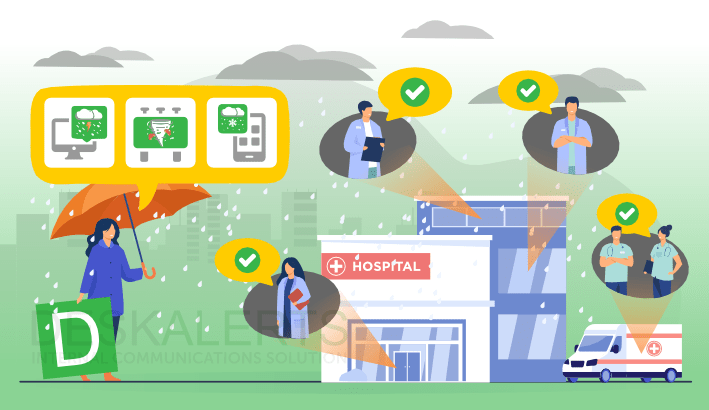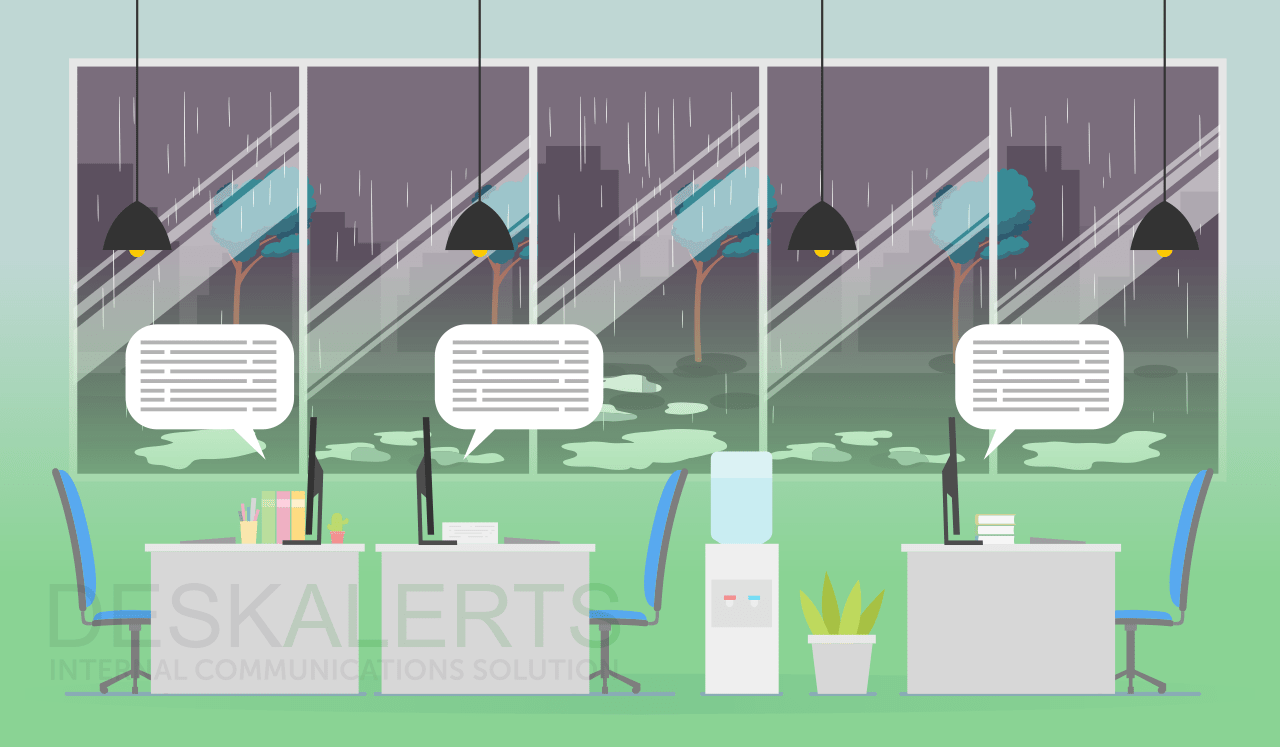
Is your healthcare organization prepared for how it will continue to operate in the event of a severe weather episode? Inclement weather policies for hospitals are important to guide the organization when the weather turns nasty.
Why is an inclement weather policy important for hospitals?
Hospitals and healthcare facilities are relied upon by the community to stay open and remain functioning during a range of adverse events, including inclement weather. When hurricanes, tornados, blizzards, heatwaves, and storms happen, hospitals generally don’t have the option to close like other organizations.
Having appropriate policies in place to deal with inclement weather can help hospitals to manage the situation so as to minimize disruptions and ensure the safety of patients and staff.
Learn more: Hospital communication system.
What should be in your hospital’s inclement weather policy?
Your hospital’s inclement weather policy will set out guidance on what to do during a severe weather event. It should include information about what to do in a range of different circumstances, including:
Whether staff should attempt to attend the workplace
If there are any categories of staff (eg: administration) who can work remotely during inclement weather.
- Will arrangements such as food and accommodation be made if staff are stranded at work during an inclement weather event.
- Evacuation procedures for different inclement weather scenarios.
- Drills and other scenario planning ahead of time.
- What steps can staff take to keep themselves and patients safe?
- Will jobs and pay or other entitlements such as leave be affected?
- How will you activate the plan when necessary?
- Do you need to include provisions for COVID-19?
- When staff need to follow directives from local law enforcement, local government, the Federal Emergency Management Agency (FEMA) etc.
How to communicate your inclement weather policy
It’s important that employees understand that you have a policy around inclement weather. This includes what it means and what is expected of them in the event of a severe weather episode. If the first time employees hear about an inclement weather policy is when you have to activate it, then you’ve left it too late!
The following steps should be taken to ensure that your inclement weather policy is well-known throughout your organization:
- Let people know when you have developed or updated your inclement weather policy by announcing it via a range of internal channels. For example email, corporate newsletters, pop-up notifications.
- Ensure that your inclement weather policy is easy to locate on your intranet.
- Include information about the inclement weather policy as part of your onboarding process.
- Send reminders via screensavers, digital signage, corporate wallpaper and scrolling tickers as part of an internal marketing campaign to remind staff about the policy.
- Include the inclement weather policy as part of your organization’s emergency communications plan – including the messages that you would send in severe weather events, who the recipients would be, the channels you would use and who has delegated responsibility for sending them.
- Prepare templates ahead of time so that you can send them to let people know to evacuate, shelter in place, work from home etc. in the event of a severe weather event.
- Keep contact lists up to date so nobody is forgotten.
Read more: Inclement weather email to employees
How to communicate with employees when your hospital is affected by extreme weather
When you need to communicate about extreme weather, here are the best practice principles to guide you:
1. Ensure your communications are timely
In some cases, you’ll have a little bit of warning that an extreme weather event is on the way – for example a hurricane. Others might happen more quickly, such as flash flooding. No matter how much notice you get about the inclement weather event, it’s important that you communicate with employees as quickly as possible. Time is of the essence in any emergency situation, and the more time you can give employees to prepare, the better. It also ensures that you establish a “single source of truth” with your employees so that you can avoid rumors taking hold and misinformation spreading.
2. Use all available communications channels
By using every communication channel at your disposal you have the best chance of reaching every employee. Send desktop alerts, mobile alerts, emails, digital signage alerts and text messages to let employees know that they need to take action.
3. Use mobile communications
The nature of hospitals is that not every staff member will be in the workplace when you need to alert them to an inclement weather situation. Some may be at home because they’re rostered on for a later shift, while others may be off-site on a break or conducting business elsewhere. Mobile notifications will enable you to contact any employee, no matter where they are.
4. Make use of repetition
The more times people are exposed to a message, the more likely it is that it will sink in. Repeat your message as often as needed to ensure that no matter how busy your staff are, they’ll get the message.
5. Provide status updates
Inclement weather situations are evolving. A hurricane may make landfall later than expected. A tornado may have caused power to go off in the community. Keeping hospital staff informed throughout the event will let them know what’s happening in the outside world, both for their own personal knowledge and safety and also so they can be prepared if the inclement weather event will cause an increase in casualties.
6. Check in on employees
Using DeskAlerts surveys module you can quickly send a message to all employees during an adverse weather event asking if they are okay. Using the analytics you can then determine who hasn’t answered and take steps to follow up and check on the welfare of those employees.
7. Get feedback after the event
When the weather event is over and things start to return to normal, send your employees a survey to ask them what worked well and what didn’t. Did they feel the situation was well managed? This feedback can help you to revise your inclement weather policies and procedures to do a better job next time, if necessary.
***
Being prepared for a range of different inclement weather scenarios that could affect your hospital will help you to manage things smoothly when you need to. Ensuring you have good hospital communication system in place will help to keep your employees and patients safe.
Frequently Asked Questions
What is the inclement weather policy?
An inclement weather policy is a document that outlines a hospital’s procedures, rules and expectations when there is an adverse weather situation that can disrupt service delivery.
Do hospitals ever close due to weather?
Hospitals generally don’t close because of the weather as they need to be available to people 24/7. They achieve this by putting strategies and systems in place to ensure that they can continue to function even in bad weather.
Which of the following are examples of inclement weather?
Inclement weather refers to weather conditions that have the ability to cause disruption to businesses, schools and transportation. It can include floods, blizzards, snow, ice storms, hurricanes, tornados and extreme heat.
What does inclement weather day mean?
An inclement weather day is declared when the weather conditions affect how people will get to and from work and may also affect the operations of the healthcare facility.
 Caroline Duncan
Caroline Duncan







